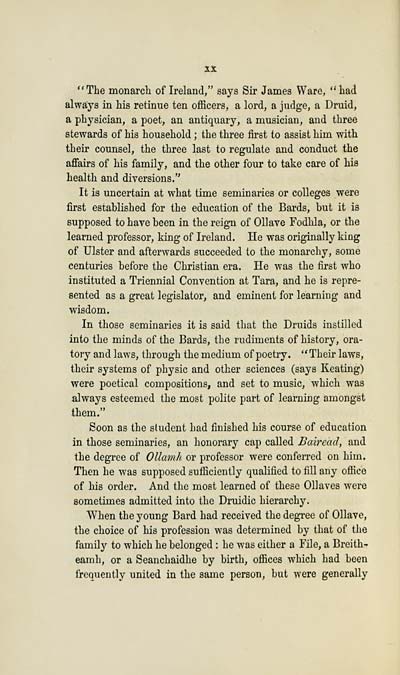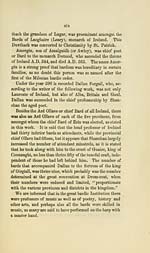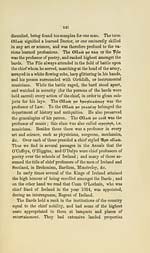Download files
Complete book:
Individual page:
Thumbnail gallery: Grid view | List view

"The monarch of Ireland," says Sir James Ware, "had
always in his retinue ten officers, a lord, a judge, a Druid,
a physician, a poet, an antiquary, a musician, and three
stewards of his household ; the three first to assist him with
their counsel, the three last to regulate and conduct the
affairs of his family, and the other four to take care of his
health and diversions."
It is uncertain at what time seminaries or colleges were
first established for the education of the Bards, but it is
supposed to have been in the reign of OUave Fodhla, or the
learned professor, king of Ireland. He was originally king
of Ulster and afterwards succeeded to the monarchy, some
centuries before the Christian era. He was the first who
instituted a Triennial Convention at Tara, and he is repre-
sented as a great legislator, and eminent for learning and
wisdom.
In those seminaries it is said that the Druids instilled
into the minds of the Bards, the rudiments of history, ora-
tory and laws, through the medium of poetry. "Their laws,
their systems of physic and other sciences (says Keating)
were poetical compositions, and set to music, which was
always esteemed the most polite part of learning amongst
them."
Soon as the student had finished his course of education
in those seminaries, an honorary cap called Baij^ead, and
the degree of Ollamh or professor were conferred on him.
Then he was supposed sufficiently qualified to fill any office
of his order. And the most learned of these OUaves were
sometimes admitted into the Druidic hierarchy.
When the young Bard had received the degree of Ollave,
the choice of his profession was determined by that of the
family to which he belonged : he was either a File, a Breith-
eamh, or a Seanchaidhe by birth, offices which had been
frequently united in the same person, but were generally
always in his retinue ten officers, a lord, a judge, a Druid,
a physician, a poet, an antiquary, a musician, and three
stewards of his household ; the three first to assist him with
their counsel, the three last to regulate and conduct the
affairs of his family, and the other four to take care of his
health and diversions."
It is uncertain at what time seminaries or colleges were
first established for the education of the Bards, but it is
supposed to have been in the reign of OUave Fodhla, or the
learned professor, king of Ireland. He was originally king
of Ulster and afterwards succeeded to the monarchy, some
centuries before the Christian era. He was the first who
instituted a Triennial Convention at Tara, and he is repre-
sented as a great legislator, and eminent for learning and
wisdom.
In those seminaries it is said that the Druids instilled
into the minds of the Bards, the rudiments of history, ora-
tory and laws, through the medium of poetry. "Their laws,
their systems of physic and other sciences (says Keating)
were poetical compositions, and set to music, which was
always esteemed the most polite part of learning amongst
them."
Soon as the student had finished his course of education
in those seminaries, an honorary cap called Baij^ead, and
the degree of Ollamh or professor were conferred on him.
Then he was supposed sufficiently qualified to fill any office
of his order. And the most learned of these OUaves were
sometimes admitted into the Druidic hierarchy.
When the young Bard had received the degree of Ollave,
the choice of his profession was determined by that of the
family to which he belonged : he was either a File, a Breith-
eamh, or a Seanchaidhe by birth, offices which had been
frequently united in the same person, but were generally
Set display mode to: Large image | Transcription
Images and transcriptions on this page, including medium image downloads, may be used under the Creative Commons Attribution 4.0 International Licence unless otherwise stated. ![]()
| Early Gaelic Book Collections > J. F. Campbell Collection > Transactions of the Ossianic Society > Volume 5 > (24) |
|---|
| Permanent URL | https://digital.nls.uk/82282097 |
|---|
| Description | Dublin : Printed under the direction of the Council, 1854-1861. |
|---|---|
| Shelfmark | Cam.1.c.5-10 |
| Additional NLS resources: | |
| Description | Volumes from a collection of 610 books rich in Highland folklore, Ossianic literature and other Celtic subjects. Many of the books annotated by John Francis Campbell of Islay, who assembled the collection. |
|---|
| Description | Selected items from five 'Special and Named Printed Collections'. Includes books in Gaelic and other Celtic languages, works about the Gaels, their languages, literature, culture and history. |
|---|

